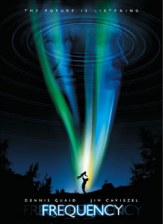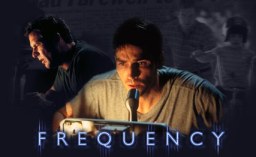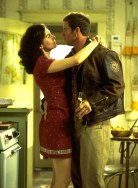| Frequency |
| |
 |
USA, 2000. Rated PG-13. 120 minutes.
Cast:
Dennis Quaid, James Caviezel, André Braugher, Elizabeth Mitchell, Noah
Emmerich, Frank McAnulty, Jordan Bridges, Michael Cera, Stephen Joffe
Writer: Toby Emmerich
Music: Michael Kamen
Cinematographer: Alar Kivilo
Producers: Bill Carraro, Toby Emmerich, Gregory Hoblit, Howard
W. Koch Jr.
Director: Gregory Hoblit
LINKS
|
 he
opening shot of Frequency conjures immediate recollection of Robert Zemeckis'
Contact, and it's clearly not accidental. The view is from space, with
the raging sun in the foreground and the planets in the distance, while radio
signals bounce around on the soundtrack. Soon we're introduced to an old ham
radio, just like the one Ellie and her dad crouched over. Soon after that, we
learn that this is the story of an adult son whose ham radio aficionado
father died when he was six. The source of inspiration is obvious, but - with
the exception of a few minor echoes - the story that Frequency ultimately
tackles is radically different from that of Contact. In the long run,
it bears more resemblance to a weird convergence of Back to the Future
and Silence of the Lambs, with a
bit of Field of Dreams tossed in for good measure. Screenwriter Toby
Emmerich has certainly seen a lot of movies!
he
opening shot of Frequency conjures immediate recollection of Robert Zemeckis'
Contact, and it's clearly not accidental. The view is from space, with
the raging sun in the foreground and the planets in the distance, while radio
signals bounce around on the soundtrack. Soon we're introduced to an old ham
radio, just like the one Ellie and her dad crouched over. Soon after that, we
learn that this is the story of an adult son whose ham radio aficionado
father died when he was six. The source of inspiration is obvious, but - with
the exception of a few minor echoes - the story that Frequency ultimately
tackles is radically different from that of Contact. In the long run,
it bears more resemblance to a weird convergence of Back to the Future
and Silence of the Lambs, with a
bit of Field of Dreams tossed in for good measure. Screenwriter Toby
Emmerich has certainly seen a lot of movies!  Fortunately,
he seeks less to ape those movies than to crib an idea or two from each, resulting
in a story that feels simultaneously familiar and unusual.
Fortunately,
he seeks less to ape those movies than to crib an idea or two from each, resulting
in a story that feels simultaneously familiar and unusual.
John Sullivan (James Caviezel) is a troubled, somewhat morose young homicide
detective, recently separated from his girlfriend, and a bit too fond of the
bottle. He and a buddy (Noah Emmerich) come across his father's old radio one
evening, throwing John into even more of a funk, because the 30-year anniversary
of his father's death is just around the corner. He leaves the radio set-up
on the desk and–lo and behold–a signal comes in... from his father, Frank (Dennis
Quaid), speaking to John in 1999 from thirty years in the past! Though it does
take a bit of chat before the two men realize who they've connected with, director
Gregory Hoblit (Primal Fear, Fallen) is admirably merciful about not
dragging out the revelation of the obvious (a strategy he sticks to throughout
the film, thank goodness!). Once John understands that he's got his father on
the line, he does what any fatherless kid would do: he tells Frank how and when
he dies, hoping that he will avert that tragedy and survive. Does he? Yes. But
don't worry that I've just spoiled things for you... because that's just the
beginning of the movie. It's an outcome that is hardly surprising anyway, given
the development of the plot prior to that point. Resurrecting dad is more of
a McGuffin and a catalyst than an end unto itself.
The real surprises come after John saves Frank, whose survival has ramifications
that neither father nor son had contemplated.  At
this point, Frequency kicks into gear and wanders in a direction that
can only be described as a bizarre jumble of genres. It ought to fail miserably,
but somehow manages to retain its grasp on a rather tenuous meshing of tones
that swings between sentimental drama and suspense, with a dollop of off-handed
humor on the side. Though sparse, it's the humor that rescues the film from
disaster by encouraging the audience to keep from taking the proceedings too
seriously. It's a movie! It knows it's a movie, and it wants us to know that
too and to have fun with it. There's so much hokum from start to finish that–were
we to take it too seriously–we'd be laughing at it instead of staying with it
and enjoying the ride. At the same time, it does take itself seriously enough
to make the drama reasonably engaging and most of the twists reasonably surprising.
I kept waiting for the movie to fall on its figurative face, but it never quite
did. Hooray!
At
this point, Frequency kicks into gear and wanders in a direction that
can only be described as a bizarre jumble of genres. It ought to fail miserably,
but somehow manages to retain its grasp on a rather tenuous meshing of tones
that swings between sentimental drama and suspense, with a dollop of off-handed
humor on the side. Though sparse, it's the humor that rescues the film from
disaster by encouraging the audience to keep from taking the proceedings too
seriously. It's a movie! It knows it's a movie, and it wants us to know that
too and to have fun with it. There's so much hokum from start to finish that–were
we to take it too seriously–we'd be laughing at it instead of staying with it
and enjoying the ride. At the same time, it does take itself seriously enough
to make the drama reasonably engaging and most of the twists reasonably surprising.
I kept waiting for the movie to fall on its figurative face, but it never quite
did. Hooray!
There are flaws aplenty, but they're mostly incidental. The action sequences
aren't especially memorable, and Hoblit tends to cheat a bit to move characters
around to where he wants them to be. On occasion, the script makes direct references
to other films in ways that seem unnecessarily obvious without adding anything
to the whole (one character discovering a dead body in an apartment where the
song Sea of Love is playing on the turntable, for instance). The answer
to one "mystery" is foreshadowed so blatantly that preschoolers would spot it
in a second. The actual ending of the film is an overly sappy montage that seems
to go on twice as long as it ought to. And don't get me started on the lack
of logic behind some of the metaphysical occurrences! Still, the whole manages
to be greater than the sum of its parts, once you accept that you're sitting
through a popcorn movie.
AboutFilm.Com
The Big Picture
|
| Alison |
B
|
| Carlo |
B
|
| Dana |
B
|
| Jeff |
B-
|
| Kris |
-
|
| ratings explained |
The contributions of the cast ought not be underestimated here. While nobody
gives an especially remarkable performance, and the roles aren't particularly
great, the actors embrace the material and play it for whatever it's worth.
Dennis Quaid (Any Given Sunday, The
Big Easy) is solid and likable as the deceased firefighter father (though
I could have probably done without the Queens, NY accent). James Caviezel (The
Thin Red Line, Ride With the Devil)
is an instinctively soulful actor who's more than easy on the eyes, which makes
following his adventures a fairly effortless pleasure. André Braugher (Primal
Fear, television's Homicide) is always a welcome sight, and
here adds a decent amount of charisma to a rather ordinary supporting role.
Because this material requires more than a bit of indulgence from the audience,
the presence of an appealing and talented cast is crucial to making it work
at all. Ultimately, it was the effort of these actors that kept me from rolling
my eyes at some of the loopy twists and the handful of somewhat treacly scenes.
Frequency is a B-Movie all the way. Though the film clearly wants to
engage our emotions regarding the yearning for familial reconnections and the
fantasy of resurrecting lost loved ones, it sacrifices any genuine measure of
gravity in the interest of entertainment value, which–believe me–was a very
good decision. The first 30-40 minutes appears to be going in the direction
of straight-faced schmaltz, which raised a low-level sense of dread in me. But
its deliberate switch to offbeat caper/thriller and an altogether less self-important
stance as a melodrama managed to surprise and please me. By the end, I was more
happy (and relieved!) to have enjoyed myself than I was concerned with the massive
plot holes or the specious metaphysics that inform the narrative. Stephen Hawking
himself couldn't hope to explain the dynamics of the climactic scene, but who
cares? It's just a movie. And a more than adequately engaging one if you shut
off your brain and just go with it.
Review
© April 2000 by AboutFilm.Com and the author.
Images © 1999 New Line Productions, Inc.
All Rights Reserved.

 Fortunately,
he seeks less to ape those movies than to crib an idea or two from each, resulting
in a story that feels simultaneously familiar and unusual.
Fortunately,
he seeks less to ape those movies than to crib an idea or two from each, resulting
in a story that feels simultaneously familiar and unusual.  At
this point, Frequency kicks into gear and wanders in a direction that
can only be described as a bizarre jumble of genres. It ought to fail miserably,
but somehow manages to retain its grasp on a rather tenuous meshing of tones
that swings between sentimental drama and suspense, with a dollop of off-handed
humor on the side. Though sparse, it's the humor that rescues the film from
disaster by encouraging the audience to keep from taking the proceedings too
seriously. It's a movie! It knows it's a movie, and it wants us to know that
too and to have fun with it. There's so much hokum from start to finish that–were
we to take it too seriously–we'd be laughing at it instead of staying with it
and enjoying the ride. At the same time, it does take itself seriously enough
to make the drama reasonably engaging and most of the twists reasonably surprising.
I kept waiting for the movie to fall on its figurative face, but it never quite
did. Hooray!
At
this point, Frequency kicks into gear and wanders in a direction that
can only be described as a bizarre jumble of genres. It ought to fail miserably,
but somehow manages to retain its grasp on a rather tenuous meshing of tones
that swings between sentimental drama and suspense, with a dollop of off-handed
humor on the side. Though sparse, it's the humor that rescues the film from
disaster by encouraging the audience to keep from taking the proceedings too
seriously. It's a movie! It knows it's a movie, and it wants us to know that
too and to have fun with it. There's so much hokum from start to finish that–were
we to take it too seriously–we'd be laughing at it instead of staying with it
and enjoying the ride. At the same time, it does take itself seriously enough
to make the drama reasonably engaging and most of the twists reasonably surprising.
I kept waiting for the movie to fall on its figurative face, but it never quite
did. Hooray!
